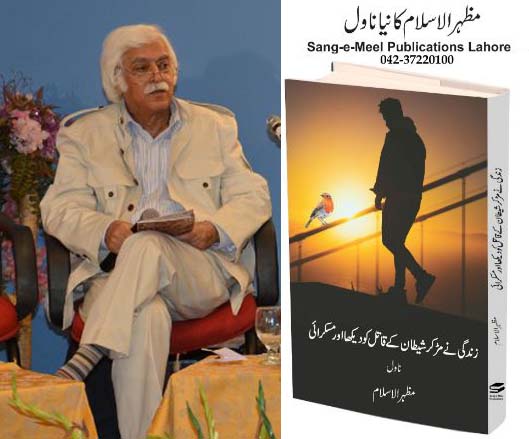Mazharul Islam’s latest novel on decline of values hits bookstores
Staff Reporter
ISLAMABAD, FEB 19: /DNA/ – Noted Urdu story writer Mazharul Islam’s latest work of fiction, a fantasy novel, “Zindagi Nay Mur Kar Shaitan Ke Qatil Ko Dekha Aur Muskurai” a combination of unique, abstract, surreal and allegorical themes has emerged on the literary horizon recently and is selling like hot cake and a subject of literary gossip today.
Like his previous novel, ‘Sarus Cranes Apnay Khawbon Mai Say Urr Kar Ja Chukay Hain’ which is a time-travel novel, in this novel (Zindagi Nay Mur Kar Shaitan Ke Qatil Ko Dekha Aur Muskurai) too, Mazhar experiments and breaks the conventional shackles of time and space, theme and diction we usually find in a novel.
But Mazhar is not a ‘usual’ novelist, he loves to go against the current and this is something that singles him out among his contemporaries.
Although ‘Zindagi Nay Mur Kar…’ has come after a gap of two years (Sarus Crane was published in 2023) yet according to the writer, it took him 15 years to complete it. “Even prior to that, I had a vague idea of this novel when I was 8 years old, a student of Grade-4 at Mission High School,” the writer tells his interviewer.
The story is a complete work of fantasy but at the same time it has shades of magical realism and surrealism. The element of fantasy is so strong it takes the shape of a story and characters are born out of it so that the writer can convey his message to the readers.
One comes across characters that are fast moving out of our life. Once they were considered a vital link such as postman, librarian, flower sellers, watchmakers, schoolteachers, mystics. Their very presence gives the novel a vibrant appeal and makes the story all the more riveting.
The writer takes the reader along from the childhood days of the protagonist Abdullah who has one fixation in life: To kill Devil and restore forgotten values! Only then this society will be rescued from the Devilish Cycle and love, forgiveness, friendship and generosity will dawn. Abdullah is the last romantic man of this world. He is in romance with reading novels, writing stories, following the footsteps of the Mystics. He is in romance with love-letters and finally this romance becomes his ideology of life. His mother once told him that the devil had killed his father and since that day he has taken upon himself to kill the devil. In the end, the devil is killed though not with the sword but with the pen.
Apart from the writer’s perspective, the reader finds the canvas and scope of the story quite vast and breathes in different epochs.
The subject of the novel is although a much-beaten and complex issue i.e. ‘decline of values and romance’ yet the writer has presented it in a fresh and lively way generating a healthy debate.
We are living in an age of Devil. People are inspired by the successful achievements of Devil, says the writer in the preface that is written in the form of a dialogue. “The devil has kept us away from positive ways of life such as book-reading, letter-writing, presenting gifts, visiting friends/relatives/patients and enjoying peace in life,” the writer asserts. We are idealizing comedians and politicians and consider them successful men. They have become our role models. Unfortunately, we no longer respect a wise man and judge people on the basis of their financial income and worldly gains. This is all the work of Devil and unfortunately, we have sold our souls to the devil. This is an ongoing debate that runs across the novel from chapter-1 to chapter-37 in this 280-page novel. With more than ten books of fiction, novel and short stories (one on folklore) to his name Mazharul Islam’s works have been translated into English, German, Chinese, Japanese, Italian, Turkish, Persian, Punjabi and Sindhi languages.












